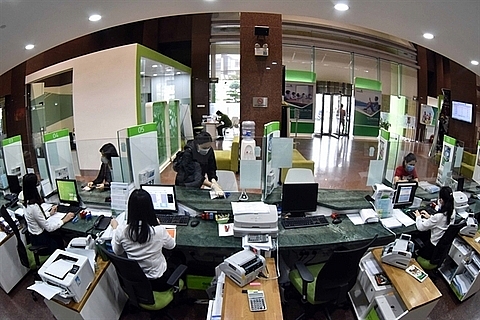Despite lower interest rates, people still put money in banks
 |
| Customers transact at Vietcombank's head quarter at 198 Tran Quang Khai Street, Ha Noi - VNA/VNS Photo Tran Viet |
Nguyen Hong Ha, a nurse in Hanoi sold her gold when the gold prices were near the peak last month at VND59 million (US$2,544) per tael.
“I was so lucky to put my gold-selling money in the bank instead of buying more gold when the gold prices went lower. If I had not done that, I would have been lost the profit I gained from the gold-selling as the gold prices went down sharply and suddenly," she told Viet Nam News.
When considering whether to continue investing in gold or not, Ha deposited her money in a commercial bank for a month at an interest rate of 4 per cent per year. Now the rate for the same term has been reduced to 3.5 per cent.
Seeing the falling interest rate for bank short term deposits, Ha said she may look for a long term deposit.
Interest rates for deposit terms of more than a year in most commercial banks are still about 7 per cent annually, and above 8 per cent at a few banks, while the short-term rate has decreased sharply.
According to the latest deposit interest rate schedule in September, banks with highest deposit interest rates included the Saigon - Hanoi Commercial Joint Stock Bank (SHB) with a rate of up to 8.95 per cent per year for a 13-month term, the Viet Capital Commercial Joint Stock Bank (Viet Capital Bank) with a rate of 8.5 per cent per year for the same term, the Vietnam Export Import Commercial Joint Stock Bank (Eximbank) with the rate of 8.4 per cent per year for 13 months and 24 months.
However, to enjoy these attractive interest rates, customers need to deposit at least VND500 billion ($21.7 million).
As for smaller deposits, the highest interest rate is between 7.6 and 7.7 per cent per year at the National Joint Stock Commercial Bank (NCB) and Dong A Commercial Joint Stock Bank (Dong A Bank).
Meanwhile, interest rates for less than a six-month term at most banks have been adjusted to below 4 per cent per year. Some banks only pay interest of less than 3 per cent per year for a term of one month.
Viet Nam Technological and Commercial Joint Stock Bank (Techcombank) announced it would lower deposit rates from 0.3 to 0.6 percentage points per year for short-term deposit from two weeks earlier. Currently, the interest for a one-month term deposited at Techcombank is 2.7 per cent per year.
The rate of Techcombank is lower compared to the average rate of 3.5 per cent per year applied at four commercial banks with State capital and much lower than the ceiling interest rate of 4.25 per cent per annum regulated by the State Bank of Viet Nam (SBV).
According to the report of SSI securities firm, normally, interest for deposits was lower in State-owned commercial banks. But now, the firm saw some joint-stock banks such as Techcombank, ACB and VPBank had their interest lower than that State-owned banks.
According to banking insiders, many people take short-term deposits of up to six months when the interest rates change a lot.
While the interest rate stood at a low level, Can Van Luc, chief economist of BIDV, said: “Bank savings was still an attractive channel in this time as it is still one of the safe investment channels, especially during the current pandemic.”
“Customers of long term deposit still enjoy an interest rate of at least 6.5 per cent per year," he added.
Other experts also said when gold prices and the securities market have been fluctuating so much and realty market is quiet, corporate bonds with high-interest of 10 – 11 per cent per year could bring high risk of loss due to the difficulties corporations face from the pandemic, many investors would take bank deposits as a priority.
According to the SBV’s data, by end of July, capital mobilisation increased by 5.31 per cent while the credit of the whole system increased only 3.45 per cent compared to the end of 2019.
The bank said liquidity was abundant, but the demand for credit for production and business was still low because of the return of COVID-19. It led to the drop in interbank interest rates, reflecting in low demand for loans between banks.
What the stars mean:
★ Poor ★ ★ Promising ★★★ Good ★★★★ Very good ★★★★★ Exceptional
Related Contents
Latest News
More News
- 0.1 per cent tax proposed on each transfer of digital assets (February 05, 2026 | 17:27)
- Ministry of Finance tightens policy delivery at start of year (February 05, 2026 | 17:26)
- Vietnam steps up market reforms as FTSE Russell reviews upgrade progress (February 05, 2026 | 17:20)
- 2025 profits mixed amid strong energy and farming results (February 05, 2026 | 17:18)
- Cashless payments hit 28 times GDP in 2025 (February 04, 2026 | 18:09)
- SSIAM and DBJ launch Japan Vietnam Capital Fund (February 04, 2026 | 15:57)
- Banks target stronger profits, credit growth in 2026 (February 04, 2026 | 15:43)
- Vietnam on path to investment-grade rating (February 03, 2026 | 13:07)
- Consumer finance sector posts sharp profit growth (February 03, 2026 | 13:05)
- Insurance market building the next chapter of protection (February 02, 2026 | 11:16)

 Tag:
Tag:




















 Mobile Version
Mobile Version